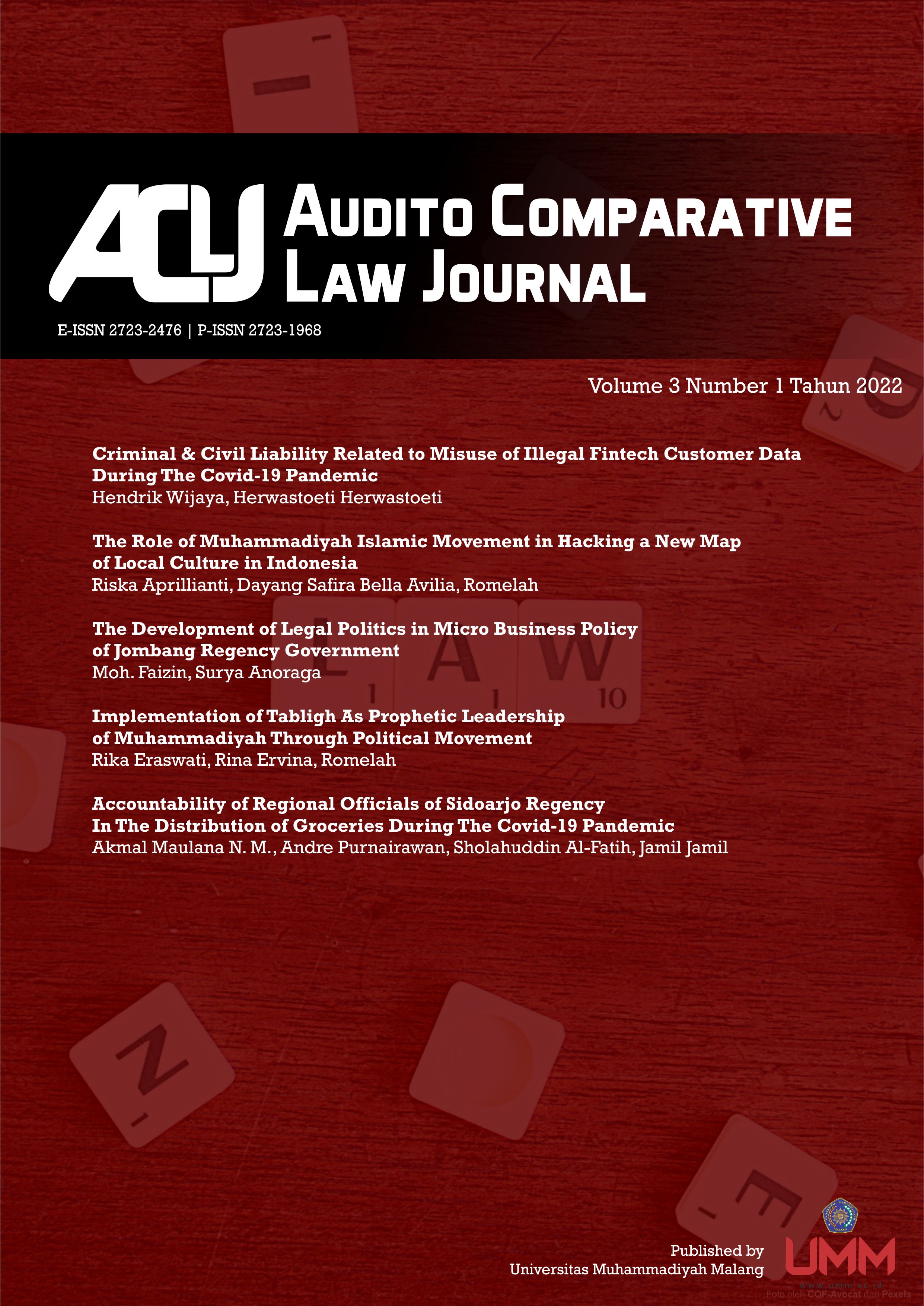Criminal & Civil Liability Related to Misuse of Illegal Fintech Customer Data During The Covid-19 Pandemic
DOI:
https://doi.org/10.22219/aclj.v3i1.19873Keywords:
Financial Technology, E-agreement, Criminal LiabilityAbstract
The covid-19 outbreak that swept across the world has caused a crisis in the economic sector, where physical distancing policies affect the world of trade and tourism. The bankruptcy of companies, hotels, and small and medium-sized micro-enterprises resulted in massive job cuts. Therefore, many people lose their livelihoods and borrow money to meet their daily needs. Financial technology is an advancement of the times in the industrial era 4.0, as a form of convenience in financial services of tempted communities and applying for loans to financial technology. However, instead of getting a financial solution, what happens is the opposite. Where the public is even entangled in the existence of illegal financial technology and there is a misuse of their personal data. It is true that there is an agreement that allows the debtor to access the personal data of the creditor, but whether with it immediately the debtor can misuse the customer's personal data. Therefore, in this study, the author is interested in reviewing how criminal and civil liability related to the emergence of illegal financial technology agreements during the Covid-19 pandemic. The research methods used are normative juridical with statute approach and comparative approach, as well as qualitatively described legal material analysis. The result obtained is, illegal fintech e-agreements do not meet the subjective and objective requirements of the agreement and are related to the misuse of customer data, which can be held criminally accountable are fintech law bodies and debt collectors.
Downloads
References
Anggraeny, I., & Al-Fatih, S. (2020). Kata Sepakat Dalam Perjanjian Dan Relevansinya Sebagai Upaya Pencegahan Wanprestasi. DE LEGA LATA: Jurnal Ilmu Hukum, 5(1), 57–66. https://doi.org/10.30596/dll.v5i1.3446
Cahyadi, T. N. (2020). Aspek Hukum Pemanfaatan Digital Signature Dalam. Jurnal Rechtsvinding, 9, 219–236. Retrieved from http://dx.doi.org/10.33331/rechtsvinding.v9i2.424
Disemadi, H. S., & Regent. (2021). Urgensi Suatu Regulasi yang Komprehensif Tentang Fintech Berbasis Pinjaman Online Sebagai Upaya Perlindungan Konsumen di Indonesia. Jurnal Komunikasi Hukum, 7(2), 605–618. Retrieved from http://dx.doi.org/10.23887/jkh.v7i2.37991
Fajria, R. N. (2019). Potensi Sinergitas Fintech Dengan Bank Syariah Dalam Meningkatkan Kinerja Perbankan Syariah Di Indonesia. Jurnal of Islamic Banking and Finance, 3(1), 174–181. https://doi.org/10.21043/malia.v3i2.8450
Hanifawati, S. D. (2021). Urgensi Penegakan Hukum Pidana pada Penerima Pinjaman Kegiatan Peer To Peer Lending Fintech Ilegal dan Perlindungan Data Pribadi. Jurnal Penegakan Hukum Dan Keadilan, 2(2), 162–172. https://doi.org/10.18196/jphk.v2i2.12181
Herwastoeti. (2021). Revocation Of Business Competition Supervisory Commission Decisions Over Cartel-Related Cases In Indonesia. Audito Comparative Law Journal, 2(3), 171–178. Retrieved from https://doi.org/10.22219/aclj.v2i3.18167
Kartikawati, D. R. (2021). Tanggung Jawab Rumah Sakit terhadap Pemenuhan Hak Pasien pada Masa Pandemi COVID-19. Indonesia Law Reform Journal (ILREJ), 1(3), 318–335. Retrieved from https://doi.org/10.22219/ilrej.v1i3.18223
Lestari, T. W. S. (2017). Komparasi Syarat Keabsahan “Sebab Yang Halal” Dalam Perjanjian Konvensional dan Perjanjian Syariah. Jurnal Pemikiran Hukum Dan Hukum Islam, 8(2), 281–298. Retrieved from http://dx.doi.org/10.21043/yudisia.v8i2.3240
Mahardika, V. (2021). Strengthening LHKPN: Prevention Of Illicit Enrichment In Efforts To Eradicate Corruption. Audito Comparative Law Journal (ACLJ), 2(2), 66–73. https://doi.org/10.22219/aclj
Molan, M., Bloy, D., & Lanser, D. (2003). Modern Criminal Law (Fifth Edit). London: Cavendish Publishing. https://doi.org/10.4324/9781843145141
Olifiansyah, M. (2021). Legal protection of personal data theft and the danger of use of online loan applications perlindungan hukum pencurian data pribadi dan bahaya penggunaan aplikasi pinjaman online. Jurnal Hukum De’rechtsstaat, 7(2), 199–205. https://doi.org/10.30997/jhd.v7i2
Pratama, A. P., Disemadi, H. S., & Prananingtyas, P. (2019). Existence and Position of Islamic Economic Laws in Indonesia. Legality : Jurnal Ilmiah Hukum, 27(2), 222. https://doi.org/10.22219/jihl.v27i2.10159
Putra, N., Najih, M., & Pratiwi, C. S. (2021). Bentuk Penegakan Hukum Terhadap Tindak Pidana Melawan Aparat yang sedang Bertugas dalam Penanggulangan Pandemi Covid–19 (Studi di Kepolisian Resort Kota Batu). Indonesia Law Reform Journal (ILREJ), 1(3), 336–353. Retrieved from https://doi.org/10.22219/ilrej.v1i3.17944
Salam, S., Suhartono, R. M., & La Dee, M. (2021). Construction of the Concept of Building Populist Economic Law. Audito Comparative Law Journal (ACLJ), 2(3), 119–130. https://doi.org/10.22219/aclj.v2i3.17494
Salsabila, E. S. (2020). Analisis Yuridis Kewenangan Bumn Untuk Melakukan Monopoli Dan Atau Pemusatan Kegiatan Dalam Perspektif Kepastian Hukum Dan Kesejahteraan. Audito Comparative Law Journal (ACLJ), 1(1), 38–55. Retrieved from https://doi.org/10.22219/audito.v1i1.12784
Sulistya, A. Q. P. (2020). Protection Of The Civilian Population As The Implementation Of The Principle Of Discrimination. Audito Comparative Law Journal (ACLJ), 1(2), 94–104. Retrieved from https://doi.org/10.22219/audito.v1i2.13753
Downloads
Published
How to Cite
Issue
Section
License
Copyright (c) 2022 Hendrik Wijaya, Herwastoeti Herwastoeti

This work is licensed under a Creative Commons Attribution-ShareAlike 4.0 International License.








